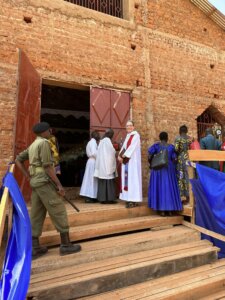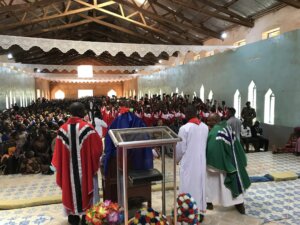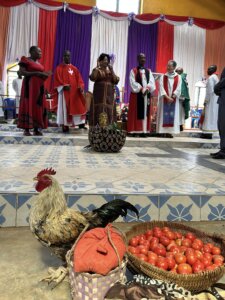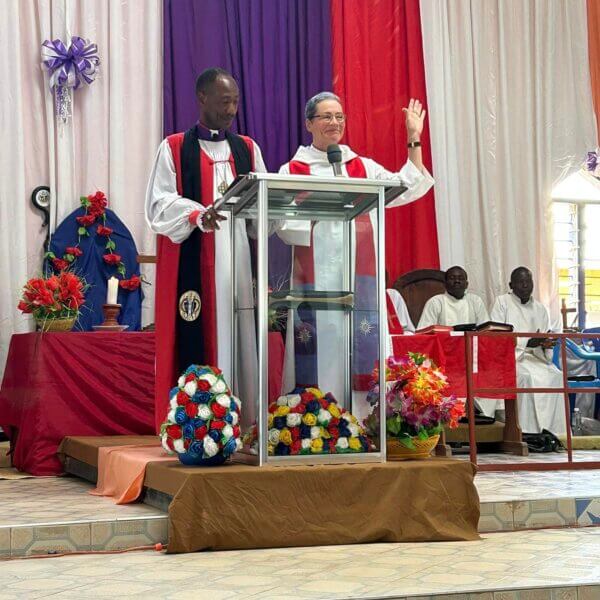
Roho Mtakatifu
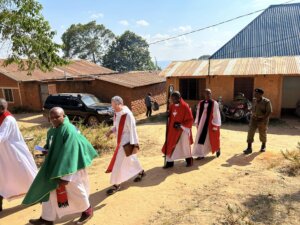 Good morning. Jina langu (my name is) Della+. I am honored to be invited to preach in Kitambuka Parish today by your priest, The Rev. Canon Zebedee Rugegera, and your Bishop, Emmanuel Bwatta. I first met your Bishop almost twenty years ago when he came to the United States to our church in Atlanta, All Saints’ Episcopal Church. Bishop Emmanuel studied at Sewanee: The University of the South. He was a great student and won the Hebrew prize at Sewanee.
Good morning. Jina langu (my name is) Della+. I am honored to be invited to preach in Kitambuka Parish today by your priest, The Rev. Canon Zebedee Rugegera, and your Bishop, Emmanuel Bwatta. I first met your Bishop almost twenty years ago when he came to the United States to our church in Atlanta, All Saints’ Episcopal Church. Bishop Emmanuel studied at Sewanee: The University of the South. He was a great student and won the Hebrew prize at Sewanee.
In those days, I was a lawyer, but I realized when I first visited DWT in 2009 — and saw, and felt, the Holy Spirit here in DWT — that I was called to be a priest. I was also a wife to my husband, Jere, and a mama our son, Judson, and our daughter, Aubrey. But I became a student also, studying theology so that I could become a priest some day. Our son and daughter are adults now and were both married last year. Our son and his wife will have a baby girl in January, so I will be a grandmother! And I am also now a priest. I am the rector of Emmanuel the Church in Newport, Rhode Island, a small old city in New England on the Northeastern coast of the United States.
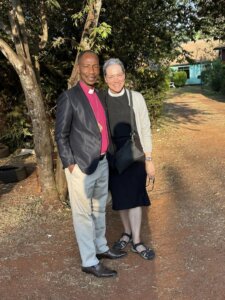 Bishop Emmanuel has visited me in Newport and brought greetings from all of you in DWT to Emmanuel the Church. We pray for you at Emmanuel Church. You are in our hearts. We all share in our unity through baptism in the Holy Spirit — roho mtakatifu.
Bishop Emmanuel has visited me in Newport and brought greetings from all of you in DWT to Emmanuel the Church. We pray for you at Emmanuel Church. You are in our hearts. We all share in our unity through baptism in the Holy Spirit — roho mtakatifu.
While I was a student, Bishop Emmanuel sometimes helped me with my papers. He told me that he wanted his students at the Kasulu Bible College to preach from the Old Testament, so I worked hard to preach from the Old Testament. And I will try to preach from the Old Testament today, even though our lessons are about receiving the Holy Spirit through baptism, which we Christians often think of as a gospel idea from the New Testament.
Lakini (but) — Let’s remember that in the beginning, when the earth was formless and void, the Holy Spirit was there. The Spirit moved over the waters as God separated the earth from the waters and heavens and breathed life into humanity — into all of us. And the Spirit was present with Moses and Zipporeh, Abraham and Sarah, Isaac and Rebekah, Jacob and Rachel, and all of our ancestors in the faith. We know this from the stories of God’s people’s experiences with God all through the Old Testament. So, Bishop Emmanuel, I am preaching from the Old Testament today even though we will be talking about St. Paul’s Letter to the Ephesians and John’s gospel.
Today’s lesson tells us that when St. Paul arrives in Ephesus, the disciples there tell him that they have never heard of the Holy Spirit! The people in Ephesus were both Jews and Gentiles, so many of them did know the Hebrew Bible. That means that they knew all the stories of their ancestors in the faith, and their experiences of God through the Spirit. But even so, they tell St. Paul that they have been baptized by John with water in the baptism of repentance, and not yet in to Jesus’ baptism of the Holy Spirit. So Paul placed his hands upon them, and they were baptized in the name of Jesus, and received the Holy Spirit, and their lives changed.
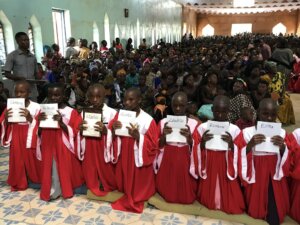 Have you received the Holy Spirit — roho mtakatifu— through baptism? I know that the candidates for confirmation have been baptized. I think also that many of you have been baptized, because I can see the Holy Spirit at work in your unity — umoja. I see the Holy Spirit in your hospitality and your warm welcome of visitors — wageni — as friends. I can see the Holy Spirit at work in your community projects, in the beautiful music of your youth choirs and Mothers’ Union. I can see the Holy Spirit is at work among us here as Bishop Emmanuel prepares to confirm these young people today, and the Holy Spirit will change their lives. The confirmands will take on roles in this community and grow in the spirit as they walk in Jesus’ love.
Have you received the Holy Spirit — roho mtakatifu— through baptism? I know that the candidates for confirmation have been baptized. I think also that many of you have been baptized, because I can see the Holy Spirit at work in your unity — umoja. I see the Holy Spirit in your hospitality and your warm welcome of visitors — wageni — as friends. I can see the Holy Spirit at work in your community projects, in the beautiful music of your youth choirs and Mothers’ Union. I can see the Holy Spirit is at work among us here as Bishop Emmanuel prepares to confirm these young people today, and the Holy Spirit will change their lives. The confirmands will take on roles in this community and grow in the spirit as they walk in Jesus’ love.
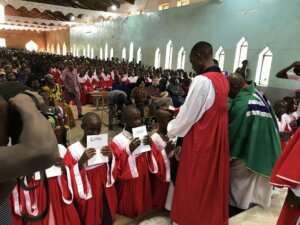
Jesus teaches us to love each other, even when we’re very different from each other, even when we have difficulty understanding one another, and even when we disagree on politics or ways of living. In John’s gospel this morning, Jesus says, If you love me, you will keep my commandments. What are God’s commandments? To love God with all our heart, mind, and strength, and to love our neighbors as we love ourselves. Loving our neighbors as ourselves is hard 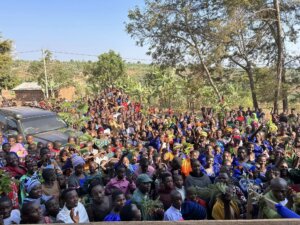 work, but we can’t love God with all our heart, mind, and strength until we do that work. We Westerners can really learn something from you Tanzanian Anglicans about loving our neighbors as ourselves. I understood the gift of the Holy Spirit in my own baptism most clearly when I visited DWT in 2009 and you welcomed me as your friend — rafiki — even though I was mzungu (a Westerner), even though I was mwanasheria (a lawyer), and even though I didn’t understand a word of Swahili. You — wewe — taught me a very important lesson: no matter how different we are, we share through our baptism in the Holy Spirit — roho mtakatifu. You showed me that we had important things in common — our love of God, our families and our neighbors; singing, dancing, beautiful kitenge, laughing together, and having fun. You work together to build your church, grow a strong community, support each other, understand each other, and help each other out.
work, but we can’t love God with all our heart, mind, and strength until we do that work. We Westerners can really learn something from you Tanzanian Anglicans about loving our neighbors as ourselves. I understood the gift of the Holy Spirit in my own baptism most clearly when I visited DWT in 2009 and you welcomed me as your friend — rafiki — even though I was mzungu (a Westerner), even though I was mwanasheria (a lawyer), and even though I didn’t understand a word of Swahili. You — wewe — taught me a very important lesson: no matter how different we are, we share through our baptism in the Holy Spirit — roho mtakatifu. You showed me that we had important things in common — our love of God, our families and our neighbors; singing, dancing, beautiful kitenge, laughing together, and having fun. You work together to build your church, grow a strong community, support each other, understand each other, and help each other out.
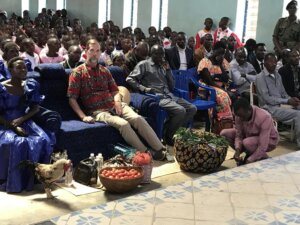 In the West, sometimes we think more about how we’re different from each other than how we’re alike as people. That kind of thinking can interfere when we try to walk in love with each other like Jesus taught us. We Westerners can get ourselves confused, thinking that everyone else’s context is just like our context, even when we live thousands of miles away, speak a different language, and everything — our culture, our money, our politics, and even our weather — is different. We can miss the work of the Holy Spirit among us.
In the West, sometimes we think more about how we’re different from each other than how we’re alike as people. That kind of thinking can interfere when we try to walk in love with each other like Jesus taught us. We Westerners can get ourselves confused, thinking that everyone else’s context is just like our context, even when we live thousands of miles away, speak a different language, and everything — our culture, our money, our politics, and even our weather — is different. We can miss the work of the Holy Spirit among us.
I can see here in Kitambuka Parish in the way you welcome me and my husband Jere — wageni (strangers/visitors) in your community — as friends and guests that the Holy Spirit is among you. I can see in your welcome that you try to see what we have in common among us — how we are alike — and we do have many things in common. Lots of us are wives, mothers, and grandmothers. All of us were were born of mothers and grandmothers.
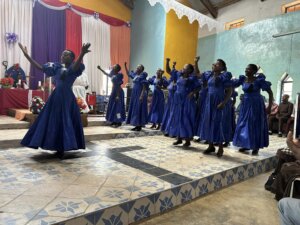 I love to sing in the choir at home, although most of us are very clumsy dancers — not like you at all! I love to garden, and we have built a community garden — a shamba — at Emmanuel the Church. We hope that working in the garden will help us to learn to take better care of our environment. We also hope that gardening will help us to be more connected with other Anglicans all over the worldwide Anglican Communion.
I love to sing in the choir at home, although most of us are very clumsy dancers — not like you at all! I love to garden, and we have built a community garden — a shamba — at Emmanuel the Church. We hope that working in the garden will help us to learn to take better care of our environment. We also hope that gardening will help us to be more connected with other Anglicans all over the worldwide Anglican Communion.
And you show us what it looks like to keep God’s commandments. Keeping God’s commandments, the core of our Christian belief, means practicing — every single day — the selfless kind of nurturing, loving, caring activity of God’s own self. Keeping Jesus’ commandment to love one another means always trying your best to do the NEXT kind thing, good thing, honest thing, fair thing, and right thing. Even when we are confused by others’ differences and have to work hard to understand each other. We follow Jesus’ example of loving one another knowing God loves us — even when we fall short of our own expectations. We are held by God’s love, embraced and adored.
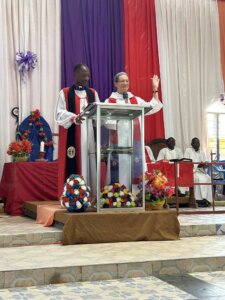 I speak now to all you mamas out there — and all of you born of mamas — as a mama myself: Isaiah 49:15 tells us that God loves us as faithfully as a woman loves her nursing baby. Thessalonians 2:7 says that God loves us as tenderly as a nurse cares for her own children. And Luke 13:34 tells us that God loves us as completely and protectively as a hen gathers her brood of chicks under her wings. In faith, we practice Jesus’ commandment to love one another as he has loved us — as selflessly as a mother loves her child. Amen
I speak now to all you mamas out there — and all of you born of mamas — as a mama myself: Isaiah 49:15 tells us that God loves us as faithfully as a woman loves her nursing baby. Thessalonians 2:7 says that God loves us as tenderly as a nurse cares for her own children. And Luke 13:34 tells us that God loves us as completely and protectively as a hen gathers her brood of chicks under her wings. In faith, we practice Jesus’ commandment to love one another as he has loved us — as selflessly as a mother loves her child. Amen
